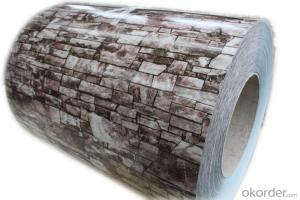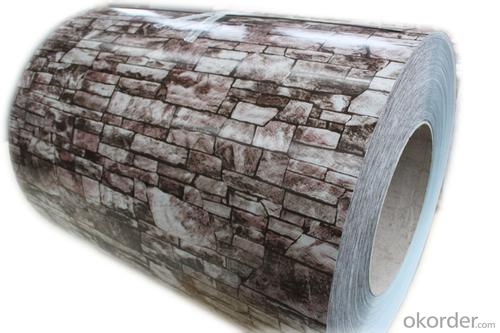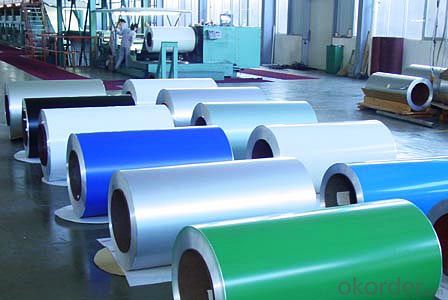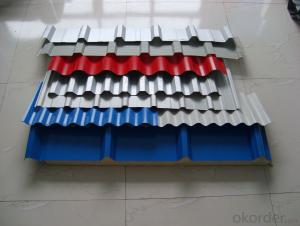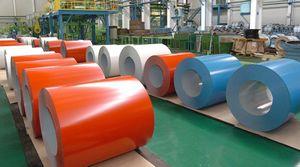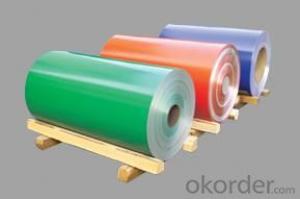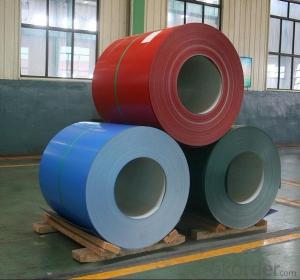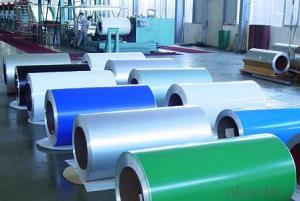3003 PVDF Painted Aluminum Coil for Making Sandwich Board
- Loading Port:
- Shanghai
- Payment Terms:
- TT OR LC
- Min Order Qty:
- 5 m.t.
- Supply Capability:
- 1000 m.t./month
OKorder Service Pledge
OKorder Financial Service
You Might Also Like
Specification
1. Structure of PVDF Painted Aluminium Coil for Making Sandwich Board Description
PVDF Painted Aluminium Coil for Making Sandwich Board is one semi-finished aluminium material. This coil can be rolled down to aluminium coil,sheet,circle ect. The alloy AA1050 is widly used in building, industry ect. Its weight is much lower than steel. So many customers choosed aluminium material instead of steel.
2. Specification of PVDF Painted Aluminium Coil for Making Sandwich Board
PVDF Painted Aluminium Coil for Making Sandwich Board | |
Main Specification | |
Alloy | AA1xxx (AA1050, AA1060, AA1070, AA1100 etc.) |
AA3xxx (AA3003, AA3004, AA3005, AA3105 etc.) | |
AA5xxx, AA6XXX (AA5052,AA5083, AA5754, AA6061, AA6062 etc.) | |
AA8xxx(AA8011, AA8006 etc.) | |
Temper | H14,H16, H18, H22, H24, H26, H32,O/F, T4, T6, T651 |
Thickmess | 0.01mm-100mm |
Width | 30mm-1700mm |
Standard | GB/T 3880-2006/ASTM |
Special specification is available on customer's requirement | |
3. Application of PVDF Painted Aluminium Coil for Making Sandwich Board
(1).Interior: wall cladding, ceilings, bathrooms, kitchens and balconies, shutters, doors...
(2).Exterior: wall cladding, facades, roofing, canopies, tunnels,column covers , renovations...
(3).Advertisement: display platforms, signboards, fascia, shop fronts...
4. Feature of PVDF Painted Aluminium Coil for Making Sandwich Board
Surfact Quality :
Be free from Oil Stain, Dent, Inclusion, Scratches, Stain, Oxide Dicoloration, Breaks, Corrosion, Roll Marks, Dirt Streaks and other defect which will interfere with use,
Mechenical Property:
Chemical Composite and Mechanical Property
5. Certificate of PVDF Painted Aluminium Coil for Making Sandwich Board
SGS and ROHS(if client request, paid by client), MTC(plant provided), Certificate of Origin(FORM A, FORM E, CO), Bureau Veritas and SGS (if client request, paid by client), CIQS certificate
6. Image of PVDF Painted Aluminium Coil for Making Sandwich Board
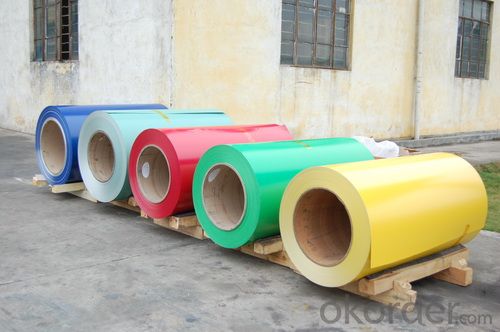
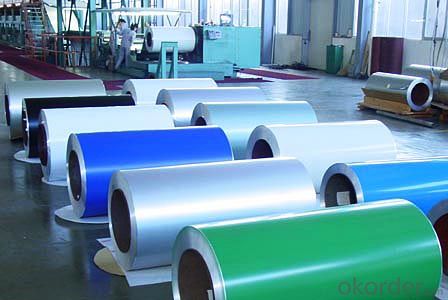
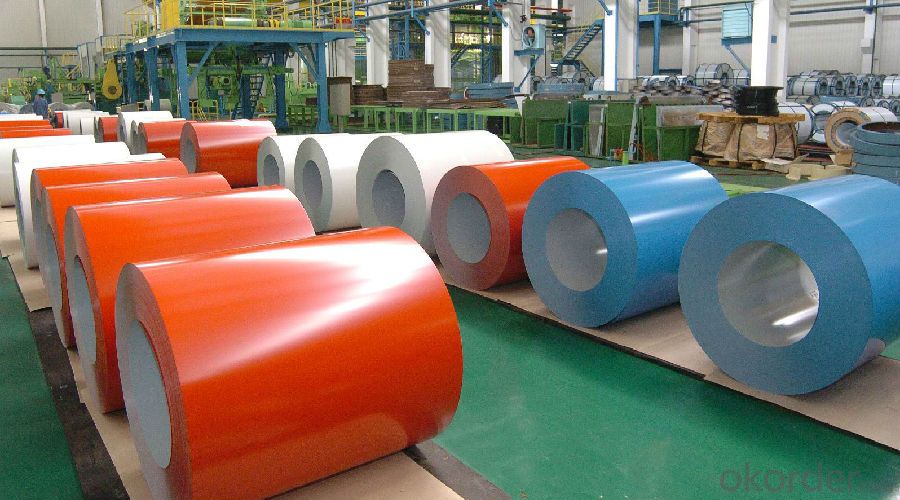
7. Package and shipping of PVDF Painted Aluminium Coil for Making Sandwich Board
First, plastic cloth with drying agent inside; Second, Pearl Wool ; Third, wooden cases with dry agent , fumigation wooden pallets, aluminum surface could cover blue PVC film
8. FAQ
1) What is the delivery time?
Depends on actual order, around 20 to 35 days
2) What is the QC system:
We have QC staff of 20 persons and advanced equipment, each production is with MTC traced from Aluminum ingot lot.
3) What market do you mainly sell to?
Australia, America, Asia, Middle East, Western Europe, Africa etc
- Q: How are aluminum coils used in the production of solar panels?
- Aluminum coils play a crucial role in the production of solar panels. These coils are typically used in the construction of the photovoltaic (PV) module, which is the core component responsible for converting sunlight into electricity. Firstly, aluminum coils are used as the primary material for the frame of the PV module. The frame provides structural support and protection to the delicate solar cells, ensuring they are secure and safe from external factors such as weather conditions or physical damage. Aluminum's lightweight yet sturdy nature makes it an ideal choice for this purpose, as it offers durability without adding excessive weight to the overall structure. Secondly, aluminum coils are often used as the backsheet material in solar panels. The backsheet is a critical component that protects the solar cells from moisture, dust, and other environmental elements. It acts as a barrier, preventing any potential damage to the cells while also providing electrical insulation. Aluminum's excellent corrosion resistance and electrical conductivity make it an ideal material for this application. Furthermore, aluminum coils are used in the production of the interconnection system within the solar panel. This system consists of conducting wires that connect the individual solar cells, allowing the flow of electricity between them. Aluminum's high electrical conductivity ensures efficient transmission of the generated electricity, minimizing energy losses within the panel. In addition to these key roles, aluminum coils are also used in the manufacturing of various other components within solar panels, such as junction boxes, connectors, and mounting systems. These components contribute to the overall functionality and reliability of the solar panel. Overall, aluminum coils are extensively utilized in the production of solar panels due to their lightweight, durable, and corrosion-resistant properties. Their versatility and ability to withstand harsh environmental conditions make them an essential material for ensuring the longevity and efficiency of solar panel systems.
- Q: Are there any limitations to the maximum coil diameter of aluminum coils?
- There exist limitations on the maximum coil diameter of aluminum coils. Factors such as the type and thickness of the aluminum, the coiling equipment, and the intended application of the coil determine the maximum coil diameter. Thinner and more ductile aluminum alloys generally allow for larger coil diameters. However, maintaining the structural integrity of the coil and preventing deformation, wrinkling, or damage during handling and transportation becomes increasingly challenging as the coil diameter increases. Moreover, the coiling equipment may have its own restrictions on the maximum diameter it can handle. Hence, it is crucial to take these factors into consideration when determining the maximum coil diameter for aluminum coils.
- Q: What are aluminum coils?
- Aluminum coils are thin, flat pieces of aluminum that are wound in a spiral shape. They are commonly used in various industries for their versatility and durability. These coils are typically made from high-quality aluminum alloy, which makes them lightweight, corrosion-resistant, and easy to work with. Aluminum coils are used in a wide range of applications, including building and construction, automotive manufacturing, electrical appliances, and packaging. They can be further processed into different forms, such as sheets, foils, or strips, depending on the specific requirements of the industry or product. Overall, aluminum coils are an essential component in many manufacturing processes and play a crucial role in various industries.
- Q: Can aluminum coils be used in electrical conductors?
- Yes, aluminum coils can be used in electrical conductors. Aluminum is a good conductor of electricity and is commonly used in various electrical applications, including wiring, power transmission, and motor windings.
- Q: I have been trying to make some thermite for a while now, and I haven't had much success. I have tried using iron oxide and that didn't work. then I tried using manganese dioxide, also without success. I'm pretty sure I have the right proportions for each of the corresponding oxides, but it just isn't working. I am using magnesium ribbon to light it.The aluminum I am using is the byproduct of me trying to cut a block of aluminum with a hacksaw (best way I have available to cut it) and there is a lot of aluminum powder that is being made. But i'm not sure if it is fine enough to be effective. I don't have an etch-a -sketch so that's not an option. I know that it has to be fairly fine grained, but how small do the particles need to be?FOR EVERYONE WHO IS GOING TO TRY AND TELL ME THAT MAKING THERMITE IS DANGEROUS OR SOMETHING ALONG THOSE LINES......DONT!!!!!!!!.......... IM NOT GOING TO LISTEN SO SAVE YOURSELF THE TYPING AND ME THE READING
- In 35+ years of demonstrating the thermite reaction, I have used fine aluminium powder to quite visible small bits. The proportions don't seem too critical, but try and keep near the amounts represented by the balanced eqtn. The difficult bit is getting the wretched stuff to ignite. With some mixes several strands of magnesium ribbon as fuse still wouldn't get it to ignite. I found a pile of 'ignition powder' at the base of the Mg often helped. There was a good commercial one available in the UK but I often made one up, main ingredients barium peroxide and magnesium powder, about 50/50. Needless to say, ignite with this mix where you won't breathe any nasty fumes. To get a good result, if I didn't use a proper crucible, I shaped one of Al foil about the capacity of 2-3 eggcups. This was put on sand in a big coffee tin, then more sand added to fill round the sides. This would give a good amount of iron. I once made the mistake of rushing in too quickly to get out the red hot iron.... and completely melted the ends of a large pair of Nickel tongs!
- Q: What are the potential health risks associated with working with aluminum coils?
- There are several potential health risks associated with working with aluminum coils. One of the main concerns is the inhalation of aluminum dust or fumes, which can lead to respiratory issues such as coughing, shortness of breath, and lung damage. Prolonged exposure to aluminum can also increase the risk of developing neurological disorders like Alzheimer's disease. Additionally, contact with aluminum coils can cause skin irritation or rashes, especially for individuals with pre-existing skin conditions or allergies. It is important to take proper safety precautions, such as wearing protective equipment and working in well-ventilated areas, to minimize these health risks.
- Q: How do aluminum coils contribute to the corrosion resistance of marine applications?
- Aluminum coils play a crucial role in enhancing the corrosion resistance of marine applications. This is primarily due to the unique properties and characteristics of aluminum as a material. Firstly, aluminum has a natural oxide layer that forms on its surface when exposed to air, which is highly resistant to corrosion. This oxide layer acts as a protective barrier that prevents further oxidation and corrosion of the metal. This inherent property of aluminum makes it an ideal choice for marine applications, where constant exposure to saltwater and moisture can be highly corrosive. Furthermore, aluminum coils can be alloyed with other elements such as magnesium and manganese to further enhance their corrosion resistance. These alloying elements not only strengthen the aluminum but also improve its resistance to pitting and crevice corrosion. Pitting corrosion occurs when localized damage to the oxide layer exposes the underlying metal, while crevice corrosion occurs in areas where oxygen is restricted, such as gaps or joints. By alloying aluminum, the coils become more resistant to these types of corrosion, making them highly suitable for marine environments. Moreover, aluminum coils can be coated with protective finishes such as anodizing or painting, which provide an additional layer of protection against corrosion. Anodizing involves creating a thicker and more durable oxide layer on the aluminum surface, thereby increasing its resistance to corrosion. Painting, on the other hand, acts as a physical barrier that shields the coils from direct contact with corrosive elements present in the marine environment. In conclusion, aluminum coils contribute to the corrosion resistance of marine applications through their natural oxide layer, alloying with other elements, and the option of protective finishes. These characteristics make aluminum coils highly durable and capable of withstanding the harsh conditions encountered in marine environments, ensuring their longevity and reliability.
- Q: The user is asking if it's possible to create furniture using aluminum coils.
- <p>Yes, you can use aluminum coils to make your own furniture. Aluminum is a versatile material known for its strength, durability, and lightweight properties, making it suitable for furniture construction. You can bend and shape aluminum coils to create unique designs for chairs, tables, or shelving. However, it's essential to have the right tools and skills for cutting, bending, and joining the coils. Ensure you follow safety precautions when working with metal, and consider the structural integrity and weight distribution of your design to ensure the furniture's stability and longevity.</p>
- Q: Please tell me the model of antirust aluminium coil, it is better to have a detailed introduction. Thank you。 Shandong production of rust resistant aluminum coil manufacturers
- We are Ji'nan excellent Aluminum Co., Ltd., anti rust aluminum roll, now domestic generally use 3003 material, the price is now 19500 yuan / ton.3003 aluminum coil for AL-Mn alloy, is the most widely used of a rust resistant aluminum, density is 2.73.
- Q: What rules or laws govern the transportation of old or damaged aluminum coils?
- <p>Yes, there are regulations on the transportation of old or damaged aluminum coils. These regulations often fall under hazardous materials or waste transportation laws, depending on the condition of the coils. In the United States, the Department of Transportation (DOT) regulates the transportation of hazardous materials, which may include damaged aluminum coils if they pose a risk. The Environmental Protection Agency (EPA) also has guidelines for the transportation of waste materials. Internationally, the International Maritime Dangerous Goods (IMDG) Code and International Air Transport Association (IATA) Dangerous Goods Regulations provide guidance for the safe transport of such materials. Compliance with packaging, labeling, documentation, and handling requirements is crucial to ensure safety and avoid penalties.</p>
Send your message to us
3003 PVDF Painted Aluminum Coil for Making Sandwich Board
- Loading Port:
- Shanghai
- Payment Terms:
- TT OR LC
- Min Order Qty:
- 5 m.t.
- Supply Capability:
- 1000 m.t./month
OKorder Service Pledge
OKorder Financial Service
Similar products
Hot products
Hot Searches
Related keywords
